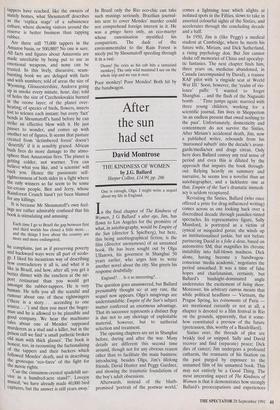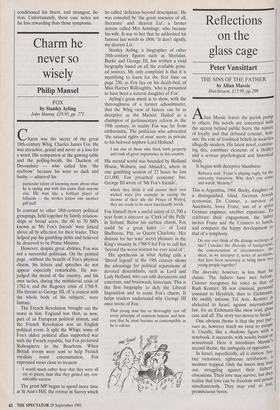After the sun had set
David Montrose
THE KINDNESS OF WOMEN by J.G. Ballard Harper Collins, £14.99, pp. 286 One is enough, Olga. I might write a sequel about my life in England.
In the final chapter of The Kindness of Women, J G Ballard' s alter ego, Jim, has flown to Los Angeles for the premiere of what, in autobiography, would be Empire of the Sun (director S. Spielberg), but here, this being autobiographical fiction, is the film (director anonymous) of an unnamed book. He has been sought out by Olga Ullanova, his governess in Shanghai 50 years earlier, who urges him to write another novel about the city. She greets his response doubtfully:
England?... Is it so interesting?.. .
The question goes unanswered, but Ballard presumably thought so: at any rate, the sequel now appears. Olga's misgivings are understandable: Empire of the Sun's subject matter conferred an enormous advantage. That its successor represents a distinct flop is due not to any shortage of exploitable material, however, but to authorial selection and treatment.
The opening chapters are set in Shanghai before, during and after the war. Many details are different this second time around, though not for any obvious reason other than to facilitate the main business: introducing, besides Olga, Jim's lifelong friends, David Hunter and Peggy Gardner, and showing the traumatic foundations of the boy's adult obsessions.
Afterwards, instead of the blurb- promised 'portrait of the postwar world,' comes a lightning tour which alights at isolated spots in the Fifties, slows to take in assorted colourful sights of the Sixties, and accelerates through the concluding decade and a half.
In 1950, Jim is (like Peggy) a medical student at Cambridge, where he meets his future wife, Miriam, and Dick Sutherland, a rising psychology don. But Jim cannot shake off memories of China and apocalyp- tic fantasies. The next chapter finds him, three years on, medicine abandoned, in Canada (accompanied by David), a trainee RAF pilot with 'a ringside seat at World
War Soon, however, the 'realm of vio- lence' palls: 'I wanted to forget Shanghai... and the flash of the Nagasaki bomb... ' Time jumps again: married with three young children, working for a scientific journal, Jim lives in Shepperton `in an endless present that owed nothing to the past'. Unfortunately, domesticity and contentment do not survive the Sixties. After Miriam's accidental death, Jim, now a published writer, rebounds from his `marooned suburb' into the decade's avant- garde/media/sex and drugs circus. Only here does Ballard convey any real sense of period and even this is diluted by the approach that impairs the book through- out. Relying heavily on summary and narrative, he seems less a novelist than an autobiographer, and a lacklustre one at that. Empire of the Sun's dramatic immedi- acy is seldom recaptured.
Revisiting the Sixties, Ballard (who once offered a prize for drug-influenced writing) comes across as one looking back over a discredited decade through jaundice-tinted spectacles. Its representative figure, Sally Mumford, is portrayed as a victim of cynical or misguided gurus; she winds up an institutionalised junkie, but not before partnering David in a folie a deux, based on automotive SM, that magnifies his chronic instability into full-blown madness. Dick alone, having become a bandwagon- conscious 'media academic,' negotiates the period unscathed. It was a time of false hopes and charlatanism, certainly, but Ballard's hindsight-dominated angle understates the excitement of being there. Moreover, his arbitrary canvas means that while political headlines — Vietnam, the Prague Spring, les evenements of Paris are mentioned cursorily or not at all, a chapter is devoted to a film festival in Rio on the grounds, apparently, that it some- how constituted a preview of the future (pretension, this, worthy of a Baudrillard).
Sixties over, the threads of plot are briskly tied or snipped. Sally and David recover and find (separate) peace; Dick dies of cancer; Jim undergoes a profound catharsis, the remnants of his fixation on the past purged by exposure to the unnamed film of his unnamed book. This may not entirely be a Good Thing. The most interesting aspect of The Kindness of Women is that it demonstrates how strongly Ballard's preoccupations and experiences
conditioned his finest, and strangest, fic- tion. Unfortunately, these case notes are far less rewarding than those symptoms.



































































 Previous page
Previous page